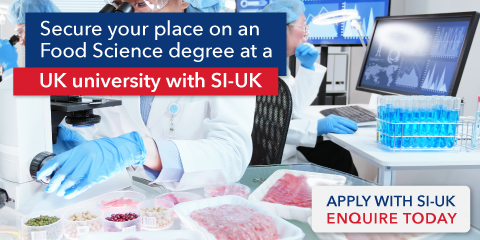UK Food Science Courses
Gain a solid understanding of the importance of food in human society as well as the current issues facing food production on a global scale
Studying a food science degree at a UK university means you are fascinated by the key aspects of food – how it is produced, it is safe, how it reacts to natural elements and if it can combat illness and disease. Be it how much fruit and vegetables to eat per day, genetically modified crops or the sugar content in the latest child-marketed drink, food science is never far from the headlines or our thoughts.
Food science is forever adapting to changing trends in an attempt to look for new ways to make food taste better, be safer and improve cost and manufacturing. Students will study a range of modules, including food composition, food safety, microbiology, product development, sustainability and physiology.
The UK is widely regarded as a world leader in Food Science courses, and as such many industry professionals will visit and teach at your chosen institution. Placements are also an option for students who wish to spend a year gaining firsthand experience in the industry. A master's of food science (MSc Food Science) is ideal for students who want to widen their skillset and boost employability.
Graduate Food Science Careers and Salary
Food science graduates will find employment in research, hygiene, nutrition, packaging, analysis, quality control and buying. Your degree can also be used in areas such as marketing and journalism, while postgraduate study is also a popular choice if you wish to stay in full-time study.
- Average starting professional salary: £21,909
- Average starting non-professional salary: £15,600
Source: The Times and Sunday Times Good University Guide 2019.
Food Science Entry Requirements
- Typical International Baccalaureate requirements: 34 points.
- Typical A-level requirements: ABB.
- Typical IELTS requirements: 6.5 overall, with no lower than 6.0 in any one component.
Please note that entry requirements vary for each UK university.
Where can I study Food Science in the UK?
To learn more about the best food science courses in the UK, find details on the top ten ranking Nutrition and Food Science universities in The Guardian University Guide 2024 below:
- Ulster University
- London Metropolitan University
- Glasgow Caledonian University
- University of Leeds
- University of Nottingham
- University of Surrey
- University of Reading
- Queen’s University Belfast
- Nottingham Trent University
- King's College London
Study Food Science in the UK
If you are interested in studying a Food Science course in the UK, arrange your free consultation today. Don't forget the Premium Service will guarantee you at least one offer from a UK university.
Popular Courses
News
Studying in the UK
My consultant was very helpful and motivating. She helped me every step of the way, even when the deadline was so close. I feel I could not have done it without her. I'd highly recommend this service to any and all of my many friends interested.
Brishti Basu Biosciences at Coventry University


















